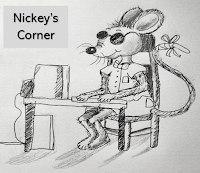Yes, for 506 years the Lutheran Church has been living into
what it has become today.
But wait!
There is more reforming to do and with some perseverance,
Lutherans will faithfully continue to reform and transform themselves into
Christ’s needed presence for the sake of our neighbor today, tomorrow, and
well, tomorrow.
This focus on tomorrow builds on nothing less than the hope
we know in the liberating resurrection of Jesus. Jesus’ act of conquering death,
thus opening the way to everlasting life in the presence of God, has freed us
all to faithfully serve our neighbor without needing to be concerned about
whether God loves us. We have been freed from seeking worthiness in the sight
of God to live a life outside of our self-consuming preeminence.
In this week’s text, John 8:31-36, Jesus speaks to a number of Jewish people who have come to believe in him, and he encourages them to persevere in the word, of him. For the sake of English economy, we usually read this passage as saying, “in my Word,” but the literal Greek might have something to offer us on this Reformation Day.
We know that the name of God, that is, Yhwh, the tetragrammaton, is not to be spoken in proper Jewish parlance. Earlier in the book of John, this practice of not saying God’s name is presented as “Logos”, “the Word” when John says, “In the beginning was the Word.” To believe “in the Word” is to believe “in God”. To believe “in Jesus” who is the son of God is to believe “in the Word.”
The use of the Logos, the Word, takes on the stature of Jesus’ more famous “I am” statements, also in John. Jesus says, “I am the bread of life”; “I am the gate”; “I am the good shepherd”; “I am the resurrection and the life”; “I am the way, the truth, and the life.” These statements echo the original “I am” statement from Exodus. There, when Moses asks God to tell him whom he should tell others has sent him, from the burning bush, the voice of God says to tell the Israelites that “I AM” has sent you.
As these “I am” statements point to the divine nature of Jesus, so John points to Jesus’ divinity using “the Word.” “If you persevere/persist/continue/remain in the Word, of me, you are truly my disciples. And you will know the Truth (here truth is also an appositive for Jesus, cf. above), and the Truth will make you free.” (v. 31, my translation)
All of this seems very involved, but, if we are to penetrate Luther’s revelation, then even I, a lowly pontiki ekklesias (church mouse), am compelled to point to the power of what it might mean to persevere “in the Word, of me.” “Persevere” carries a sense of place. The place is “in the Word”. Just as I live in my little mouse house, Jesus encourages us to persevere “in the Word, of me”. “In” seems like such a little word for such a big concept, but once we have believed “in” God, we find that it is preferable to remain “in” that presence.
Rather than being a psychological commitment, persevering “in the Word” demands a lifestyle change. Much like while dieting, one can lose weight in the short run by making a radical shift in one’s eating habits, keeping that weight off requires a new lifestyle that transforms your relationship with food. Likewise, because it is so easy to become one of the profligate prodigals, we are told to “persevere in the Word, of me”, truly becoming “disciples” of Jesus. Discipleship, therefore, causes us to live into a covenant relationship of promise. It is a lifestyle that is life-long.
On this Reformation Day, it is important to pay special attention to this “in” word. It is not only found in the Reformation Gospel passage; we also encounter it whenever saying the creed: I (or we) believe “in God”…; I (or we) believe “in Jesus Christ”…; I (or we) believe “in the Holy Spirit”…. While persevering “in the Word,” we find ourselves believing “in” the encompassing love of God’s presence, “in” the body of Christ, “in” the midst of God’s own creation.
Now we need only recognize where we live; and stay there. There are times when it feels more like running along a tight rope with the vision of what it might look like when we get to the other side, but perilous in the present place. There are also times when that sense of place is like being held in the embrace of family. True discipleship is known “in” that place where it is God’s vision that directs us, where God’s word of hope for all people empowers us, where God’s elbow leads us “in” deeper relationship with God and one another.
Oh, I could go on, but I think that you
can figure out why being made free does not depend on being Abraham’s
descendants, but on knowing what it means to be a child of God “IN” the Word which
speaks us into being today and tomorrow. May you always know the freedom of
living “IN”.
Your pal,
Nicodemus, pontiki ekklesias

